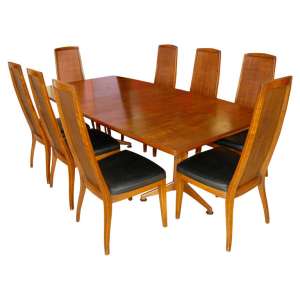 Since my mother died nearly two years ago, Dad’s been sifting through their belongings. Even though they’d downsized twice before, they’d accumulated lots of stuff during their sixty-six year marriage. What was left were the important pieces: the handcrafted cherry bed, a velvet sofa, hundreds of objets, and the dining room set.
Since my mother died nearly two years ago, Dad’s been sifting through their belongings. Even though they’d downsized twice before, they’d accumulated lots of stuff during their sixty-six year marriage. What was left were the important pieces: the handcrafted cherry bed, a velvet sofa, hundreds of objets, and the dining room set.
These are beloved pieces, each with its own story, but none appropriate for Dad’s new digs. He’s preparing to downsize from a spacious two-bedroom apartment, complete with dining room and kitchen, into a single room in a comfortable assisted-living home for seniors.
Every time I’ve visited my dad in recent months, I’ve helped him sort through his stuff – and decide what to save, what to divest. The kitchen is easy: he won’t need any pots or dishes at his new place, but the bigger pieces are harder. The dining room set, for instance, is by a fine, mid-century, furniture maker and includes what my mother always called a Break Front, (the cabinet where she stored her china, silver and linens), a table that extended eighteen feet, and chairs with leather seats.
If furniture could talk, this table would tell stories of the luncheons Mom prepared for each of our elementary school teachers back in the day when we walked home for lunch; stories of Friday night suppers that started with prayers, and birthday celebrations from one to eighty. It’s also a beautiful table, and it’s been maintained with exceptional care.
My dad wants someone in the family to take it, but his four middle-aged children all have furnished homes of their own. So we’ve made a deal.
We’ll put the table into storage, along with anything else no one is ready to claim. That way, these household goods will be available when his grandchildren graduate from shared apartments to furnished homes. Dad won’t have to give his furniture to strangers, but he also won’t have to cram everything into his living quarters as if it were a furniture warehouse.
I know that this technique of setting aside things you still love but can no longer use works. It’s a technique I use in my writing all the time. Whether it’s a paragraph or a chapter doesn’t matter: if it no longer serves the story, it just has to go.
Excising paragraphs can be painful, and pulling chapters and subplots hurts. But not everything that’s cut must go to the trash. Simply filing the pages  away can ease the trauma of excision. I store what I no longer need in my novel in a folder labeled “Outtakes.” Filed, these pages can be rediscovered and repurposed later – without cluttering the story at hand.
away can ease the trauma of excision. I store what I no longer need in my novel in a folder labeled “Outtakes.” Filed, these pages can be rediscovered and repurposed later – without cluttering the story at hand.
The current draft of Ellen is a hefty four hundred pages. There are paragraphs I love: I remember writing them, and I still find the prose sings, but it’s no longer the right melody for the story. Into the Outtakes folder it goes.
Whether it’s household chattel or purple prose, what I’ve learned is that as hard as it is to let go of things – be they tables or paragraphs – once gone, they’re rarely missed.
Cutting deadwood works for essays, short stories, poems and novels. Originally, this post was over eight hundred words; now, it’s under five hundred fifty.
 Over the years, Deborah Lee Luskin has cut millions of words from her work. Some she’s composted, others she’s burned, but the gems she’s put in storage for later use. Learn more at www.deborahleeluskin.com
Over the years, Deborah Lee Luskin has cut millions of words from her work. Some she’s composted, others she’s burned, but the gems she’s put in storage for later use. Learn more at www.deborahleeluskin.com
Interesting thoughts and lovely story about your father. It is hard to let go of those things you have collected all your life to build a home, and wonderful you have found a way to save them for loved ones who will need them.
When I begin a big editing and revising session, I save my word file as a new file, saving the old as Draft 1, 2, 3, etc. this way I always have the information and previous versions in case I choose to change them back (I never have though.) But I like your idea of saving certain parts that are cut on their own. If I ever do go back and reuse something from my old writing, it will be time consuming to find it. Wonderful idea and post.
This post is so timely for me as I am in a similar situation. I never thought about storing my parents furniture and it’s worth thinking about. My mother had so much fine furniture. If we sell it all too fast (my mother just passed in March,and my Dad immediately went into assisted living) we may regret it as we too have many teens in the family who will soon leave the nest. So thanks for the idea. I know we need to get moving on cleaning out their house but I hesitate as I get overwhelmed with it all. Perhaps storing things would be a good answer for us.
Lovely story. Thank you for sharing.
So much easier to hide your darlings than to kill them 🙂
I agree with Amy. 🙂 Then, maybe over time, the kids wander off on their own.
Nice analogy. About the literary cutting: Scott Fitzgerald said he never regretted a cut, and I feel the same, It is useless to try keep something that really doesn’t fit, though if it is beautiful that is tempting.. But I’ve found you can’t pull a fast one on readers. They’ll know if it doesn’t fit. Just this morning I’ll have to go back to what I wrote last night and cut the best three sentences I’ve written in a long time. Farewell three sentences!
What a great idea–and a great analogy too!
Interesting and very inspiring story. Keeping memories are worth to keep!